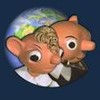The Lord of the Rings 1/26 (Pán prstenů, 1981, 2002)
![Lord of the Rings Trilogy [BBC Radio Dramatisation] Lord of the Rings Trilogy [BBC Radio Dramatisation]](http://photoload.ru/data/3d/0e/91/3d0e9168150753ff208a4d1177fe624c.jpg) J. R. R. Tolkien. Dramatizace Brian Sibley and Michael Bakewell. Hudba Stephen Oliver. Zvuk Elizabeth Parker. Produkce a režie Jane Morgan a Penny Leicester.
J. R. R. Tolkien. Dramatizace Brian Sibley and Michael Bakewell. Hudba Stephen Oliver. Zvuk Elizabeth Parker. Produkce a režie Jane Morgan a Penny Leicester.
Osoby a obsazení: vypravěč (Gerard Murphy), Frodo Baggins (Ian Holm), Gandalf (Michael Hordern), Aragorn (Robert Stephens), Samvěd Křepelka (William Nighy), Farmer Maggot (John Bott), Barliman Butterbur (James Grout), Galadriel (Marian Diamond), Celeborn (Simon Cadell), Boromir (Michael Graham Cox), Arwen Evenstar (Sonia Fraser), Gimli (Douglas Livingstone), Meriadoc Brandybuck, zvaný Merry (Richard O’Callaghan), Brandorád Bral, zvaný Pippin (John McAndrew), Legolas (David Collings), Saruman Bílý (Peter Howell), Elrond (Hugh Dickson), Bilbo Pytlík (John Le Mesurier), Glum/Sméagol (Peter Woodthorpe), Théoden (Jack May), Gríma Wormtongue (Paul Brooke), Éowyn (Elin Jenkins), Éomer (Anthony Hyde), Faramir (Andrew Seear), Stromovous (Stephen Thorne), Denethor (Peter Vaughan), Glorfindel (John Webb), Gamling (Patrick Barr), Céorl (Michael McStay), Hama (Michael Spice), Lord of the Nazgûl (Philip Voss), Ústa Sauronova (John Rye), Odula (BBC Radiophonic Workshop).
Premiéra 8. 3. 1981 – 30. 8. 1981, BBC Radio 4. Vydalo BBC Audio v roce 2002 (cca 11 hod.).
Pozn.: „Originally broadcast in 1981 on BBC Radio, this full-cast adaptation of Tolkien’s epic trilogy is justifiably regarded as a classic…Ian Holm (who appeared as Bilbo in the films) offers a mature, nuanced portrayal of Frodo that is far truer to the text than Elijah Wood’s wide-eyed innocent approach.“ —Publishers Weekly
„The lavish, atmospheric production of J.R.R. Tolkien’s The Lord of the Rings, which originally aired on the BBC in the early 1980s, has been repackaged into a handsome black boxed set that should satisfy your favorite hobbit.“ —The Boston Globe
Widely regarded as a broadcasting landmark, this thrilling dramatization by Brian Sibley and Michael Bakewell boasts a truly outstanding cast including Ian Holm, Michael Hordern, Robert Stephens, and John Le Mesurier. Tolkien’s tale relates the perilous attempt by Frodo Baggins and company to defeat the evil Saruman and dispose of the Ruling Ring. Brian Sibley, one of the original dramatists, wrote the opening and closing narration for the character of Frodo, played by Ian Holm, who now stars as Bilbo in the feature films based on The Lord of the Rings. The program includes a bonus CD featuring Steven Oliver’s complete musical score and a demo version of John Le Mesurier singing Bilbo’s Last Song. Also included: a fold-out version of the original Middle-earth map, by Christopher Tolkien. (anotace)
Pozn.: In 1981 the UK radio station BBC Radio 4 broadcast a dramatisation of J. R. R. Tolkien’s The Lord of the Rings in 26 half-hour stereo instalments. This followed a previous 12-part BBC Radio adaptation in 1955 and 1956, of which no recordings are known to have survived, and a 1979 recording by National Public Radio in the USA.
Like the novel on which it is based, The Lord of the Rings is the story of an epic struggle against the Dark Lord Sauron of Mordor, the primary villain of the work, who created a Ruling Ring to control the nineteen Rings of Power, and an alliance of heroes who join forces to save the world from falling under his shadow.
Broadcast history
Each of the original 26 episodes received two broadcasts per week – standard practice for many BBC radio serials even today. The first broadcast of Episode 2 was blacked out across a large part of south east England because of a transmitter failure (a very rare occurrence even then).
The series was also broadcast in the US on NPR with a new synopsis preceding each episode, narrated by Tammy Grimes. It was also aired in Australia.
A soundtrack album featuring a completely re-recorded and in some cases expanded, suite of Stephen Oliver’s music was released in 1981.
The 26-part series was subsequently edited into 13 hour-long episodes, restoring some dialogue originally cut for timing (since each hour-long episode is actually around 57 minutes, as opposed to 54 minutes for two half-hour episodes with overlaps and extra credits removed), rearranging some scenes for dramatic impact and adding linking narration and music cues. Even so, a small amount of material was also lost, notably a minute long scene featuring Gandalf and Pippin on Shadowfax discussing the beacon fires of Gondor. This material was not even restored to the 2002 re-edited CD version.
The re-edited version was released on both cassette tape and CD sets which also included the soundtrack album (noticeably taken from a vinyl copy). Incidentally, episode 8 of the series, The Voice of Saruman was labelled as The Voice of Sauron on the cassette box-set.
Discrepancies
The script by Brian Sibley and Michael Bakewell attempts to be as faithful as possible to the original novel, but there are some errors and alterations. They include:
* At one point, Minas Anor and Minas Tirith are referred to as though they were separate cities; these are merely alternate names for the same city.
* The radio serial omits the sequence in the book in which the hobbits visit Tom Bombadil. This sequence was also excised from the Peter Jackson film version, because, according to Jackson, it contributed nothing to the long-range narrative of the story. However, the scene was dramatised, in a similar style but with different actors, in a later series of Tolkien radio adaptations by Sibley entitled The Adventures of Tom Bombadil (a title otherwise only loosely connected with the book of the same name).
* The sub-plot which (in the book The Fellowship of the Ring) explained how Merry, Pippin and Sam knew about the Ring and the journey to Mordor was somewhat edited for the radio dramatisation, in which Gandalf arrives at The Shire one evening, and explains to Frodo the following morning about the Ring. This is overheard by Sam, who is gardening outside the window. Gandalf catches him at it, and so he and Frodo threaten punishment if he breathes a word to anyone, and that he should travel with Frodo to Mordor. Later in the story, when Merry and Pippin are explaining to Frodo how come they know so much, they reveal that Sam was the source of the information, but the information „dried up“ after Gandalf caught him. In the book, it is explained that there was a lot of investigation going on prior to Gandalf’s return to The Shire. This was not explained in the radio production, so the impression is given that prior to Gandalf’s return, Frodo, Sam, Merry and Pippin knew nothing of the significance of the ring. Gandalf’s explanation was heard by Frodo and Sam, but not by Merry and Pippin. Yet Merry and Pippin knew about it all, despite the fact that they stated that Sam had stopped giving them information after Gandalf caught him eavesdropping.
Episode list
1 The Long Awaited Party 8 March 1981
2 The Shadow Of The Past 15 March 1981
3 The Black Riders 22 March 1981
4 Trouble At The Prancing Pony 29 March 1981
5 The Knife In The Dark 5 April 1981
6 The Council Of Elrond 12 April 1981
7 The Fellowship Of The Ring 19 April 1981
8 The Mines Of Moria 26 April 1981
9 The Mirror Of Galadriel 3 May 1981
10 The Breaking Of The Fellowship 10 May 1981
11 The Riders Of Rohan 17 May 1981
12 Treebeard Of Fangorn 24 May 1981
13 The King Of The Golden Hall 31 May 1981
14 Helm’s Deep 7 June 1981
15 The Voice Of Saruman 14 June 1981
16 The Black Gate Is Closed 21 June 1981
17 The Window On The West 28 June 1981
18 Minas Tirith 5 July 1981
19 Shelob’s Lair 12 July 1981
20 The Siege Of Gondor 19 July 1981
21 The Battle Of Pelennor Fields 26 July 1981
22 The Houses Of Healing 2 August 1981
23 Mount Doom 9 August 1981
24 The Return Of The King 16 August 1981
25 Homeward Bound 23 August 1981
26 The Grey Havens 30 August 1981
Lit.: anonym: Rozhlasová hra BBC – nejlepší adaptace Tolkiena? || Tam a zase zpátky. In web Tam a zase zpátky – YouTube, 23. 5. 2024 (anotace + nahrávka k poslechu). – Cit.: Nový díl podcastu Tam a zase zpátky se věnuje možná nejlepší adaptaci Tolkienova díla všech dob: rozhlasové dramatizaci od BBC z roku 1981. Proč to je něco úplně jiného než audiokniha? Z jakého důvodu tohle divadýlko milují tolkienologové? Jak na něm spolupracoval Christopher Tolkien? Proč je Bilbo zároveň Frodo a taky zabijácký android? Co je skvělého na rozhlasovém Legolasovi? Proč je Arwen padesátiletá britská prodavačka? A hlavně – konečný důkaz o tom, že Američané jsou blázni, díky Pipinovi a Galadriel. O tom všem mluví Vašek a Lukáš. (…)
If you enjoyed this post, please consider to leave a comment or subscribe to the feed and get future articles delivered to your feed reader.






Komentáře
Zatím nemáte žádné komentáře.
Napište komentář k článku